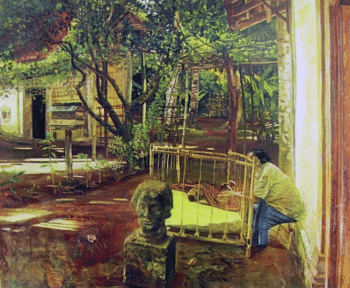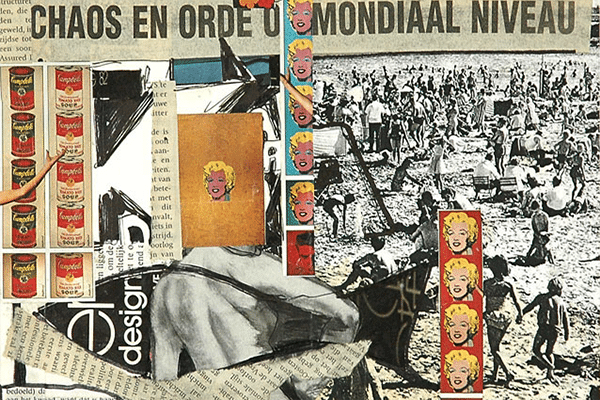Dear friends,

Kurt Nahar (Suriname), Untitled 2369, 2008.
Greetings from the desk of Tricontinental: Institute for Social Research.
On 20 July, the United Nations (UN) released a document called A New Agenda for Peace. In the opening section of the report, UN Secretary-General António Guterres made some remarks that bear close reflection:
We are now at an inflection point. The post-Cold War period is over. A transition is under way to a new global order. While its contours remain to be defined, leaders around the world have referred to multipolarity as one of its defining traits. In this moment of transition, power dynamics have become increasingly fragmented as new poles of influence emerge, new economic blocs form and axes of contestation are redefined. There is greater competition among major powers and a loss of trust between the Global North and South. A number of States increasingly seek to enhance their strategic independence, while trying to manoeuvre across existing dividing lines. The coronavirus disease (COVID-19) pandemic and the war in Ukraine have hastened this process.
We are, he says, in a moment of transition. The world is moving away from the post-Cold War era, in which the United States and its close allies, Europe and Japan, (collectively known as the Triad) exerted their unipolar power over the rest of the world, to a new period that some refer to as ‘multipolarity’. The COVID-19 pandemic and the war in Ukraine accelerated developments that were already in motion before 2020. The gradual attrition of the Western bloc has led to contestation between the Triad and newly emerging powers. This contestation is most fierce in the Global South, where trust of the Global North is the weakest it has been in a generation. The poorer nations, in the current moment, are not looking to yoke themselves to either the fragile West or the emergent new powers but are seeking ‘strategic independence’. This assessment is largely correct, and the report is of great interest, but it is also weakened by its lack of specificity.

Gladwyn K. Bush or Miss Lassie (Cayman Islands), The History of the Cayman Islands, n.d.
Not once in the report does the UN refer to any specific country, nor does it seek to properly identify the emergent powers. Since it does not provide a specific assessment of the current situation, the UN ends up providing the kind of vague solutions that have become commonplace and are meaningless (such as increasing trust and building solidarity). There is one specific proposal of great meaning, dealing with the arms trade, to which I shall return at the end of this newsletter. But apart from showing concern over the ballooning weapons industry, the UN report attempts to erect a kind of moral scaffolding over the hard realities that it cannot directly confront.
What then are the specific reasons for the monumental global shifts identified by the United Nations? Firstly, there has been a serious deterioration of the relative power of the United States and its closest allies. The capitalist class in the West has been on a long-term tax strike, unwilling to pay either its individual or corporate taxes (in 2019, nearly 40 percent of multinational profits were moved to tax havens). Their search for quick profits and evasion of tax authorities has led to a long-term decrease in investment in the West, which has hollowed out its infrastructure and its productive base. The transformation of Western social democrats, from champions of social welfare to neoliberal champions of austerity, has opened the door for the growth of despair and desolation, the emotional palate of the hard right. The Triad’s inability to smoothly govern the global neo-colonial system has led to a ‘loss of trust’ in the Global South towards the United States and its allies.

S. Sudjojono (Indonesia), Di Dalam Kampung (‘In the Village’), 1950.
Secondly, it was astounding to countries such as China, India, and Indonesia to be asked by the G20 to provide liquidity to the Global North’s desiccated banking system in 2007—08. The confidence of these developing countries in the West decreased, while their own sense of themselves increased. It this change in circumstances that led to the formation of the BRICS bloc in 2009 by Brazil, Russia, India, China, and South Africa—the ‘locomotives of the South’, as was theorised by the South Commission in the 1980s and later deepened in their little-read 1991 report. China’s growth by itself was astounding, but, as the UN Conference on Trade and Development (UNCTAD) noted in 2022, what was fundamental was that China was able to achieve structural transformation (namely, to move from low-productivity to high-productivity economic activities). This structural transformation could provide lessons for the rest of the Global South, lessons far more practical than those offered by the debt-austerity programme of the International Monetary Fund.
Neither the BRICS project nor China’s Belt and Road Initiative (BRI) are military threats; both are essentially South-South commercial developments (along the grain of the agenda of the UN Office for South-South Cooperation). However, the West is unable to economically compete with either of these initiatives, and so it has adopted a fierce political and military response. In 2018, the United States declared an end to the War on Terror and clearly articulated in its National Defence Strategy that its main problems were the rise of China and Russia. Then-US Defence Secretary Jim Mattis spoke about the need to prevent the rise of ‘near-peer rivals’, explicitly pointing to China and Russia, and suggested that the entire panoply of U.S. power be used to bring them to their knees. Not only does the United States have a vast network of roughly 800 overseas military bases—hundreds of which encircle Eurasia—it also has military allies from Germany to Japan that provide the U.S. with forward positions against both Russia and China. For many years, the naval fleets of the U.S. and its allies have conducted aggressive ‘freedom of navigation’ exercises which encroach upon the territorial integrity of both Russia (in the Arctic, mainly) and China (in the South China Sea). In addition, provocative manoeuvres such as the 2014 U.S. intervention in Ukraine and massive 2015 U.S. arms deal with Taiwan, further threatened Russia and China. In 2018, the United States unilaterally withdrew from the Intermediate Nuclear Forces (INF) Treaty (which followed the 2002 abandonment of the Anti-Ballistic Missile Treaty), a move which upset the apple cart of nuclear arms control and meant that the U.S. contemplated the use of ‘tactical nuclear weapons’ against both Russia and China.

Enrico Baj (Italy), Al fuoco, al fuoco (‘Fire! Fire!’), 1964.
The United Nations is correct in its assessment that the unipolar moment is now over, and that the world is moving towards a new, more complex reality. While the neo-colonial structure of the world system remains largely intact, there are emerging shifts in the balance of forces with the rise of the BRICS and China, and these forces are attempting to create international institutions that challenge the established order. The danger to the world arises not from the possibility of global power becoming more fragmented and widely dispersed, but because the West refuses to come to terms with these major changes. The UN report notes that ‘military expenditures globally set a new record in 2022, reaching $2.24 trillion’, although the UN does not acknowledge that three-quarters of this money is spent by the member states of the North Atlantic Treaty Organisation (NATO). Countries that want to exert their ‘strategic independence’—the UN’s phrase—are confronted with the following choice: either join in the West’s militarisation of the world or face annihilation by its superior arsenal.
A New Agenda for Peace is designed as part of a process that will culminate at a UN Summit for the Future to be held in September 2024. As part of this process, the UN is gathering proposals from civil society, such as this one from Aotearoa Lawyers for Peace, Basel Peace Office, Move the Nuclear Weapons Money campaign, UNFOLD ZERO, Western States Legal Foundation, and the World Future Council, who call on the summit to adopt a declaration that:
Reaffirms the obligation under Article 26 of the UN Charter to establish a plan for arms control and disarmament with the least diversion of resources for economic and social development;
Calls on the UN Security Council, UN General Assembly and other relevant UN bodies to take action with respect to Article 26; and
Calls on all States to implement this obligation through ratification of bilateral and multilateral arms control agreements, coupled with progressive and systematic reductions of military budgets and commensurate increases in financing for the sustainable development goals, climate protection and other national contributions to the UN and its specialised agencies.
This newsletter is dedicated to the memory of our comrade Subhash Munda (age 34), a leader of the Communist Party of India (Marxist), who was shot dead in Daladli Chowk (Ranchi, Jharkhand) on 26 July. Subhash, a fourth generation communist, was a leader of the Adivasi (indigenous-tribal) community and was killed for his fight against the land mafia. There are not enough resources in the world to satisfy the greed of the land mafias and the capitalists. But there are enough resources to fulfil human needs, as Subhash Munda knew and for which he fought.
Warmly,
Vijay


